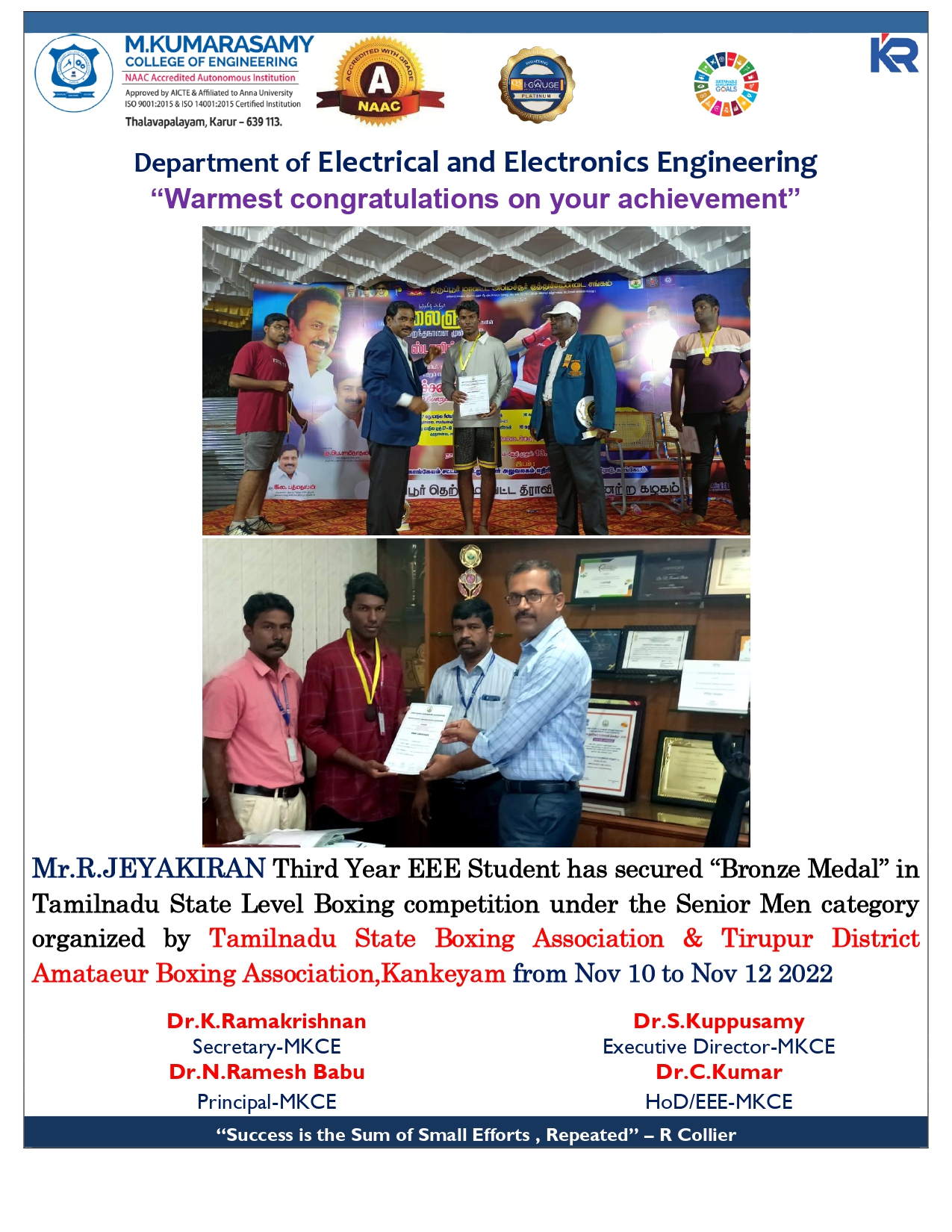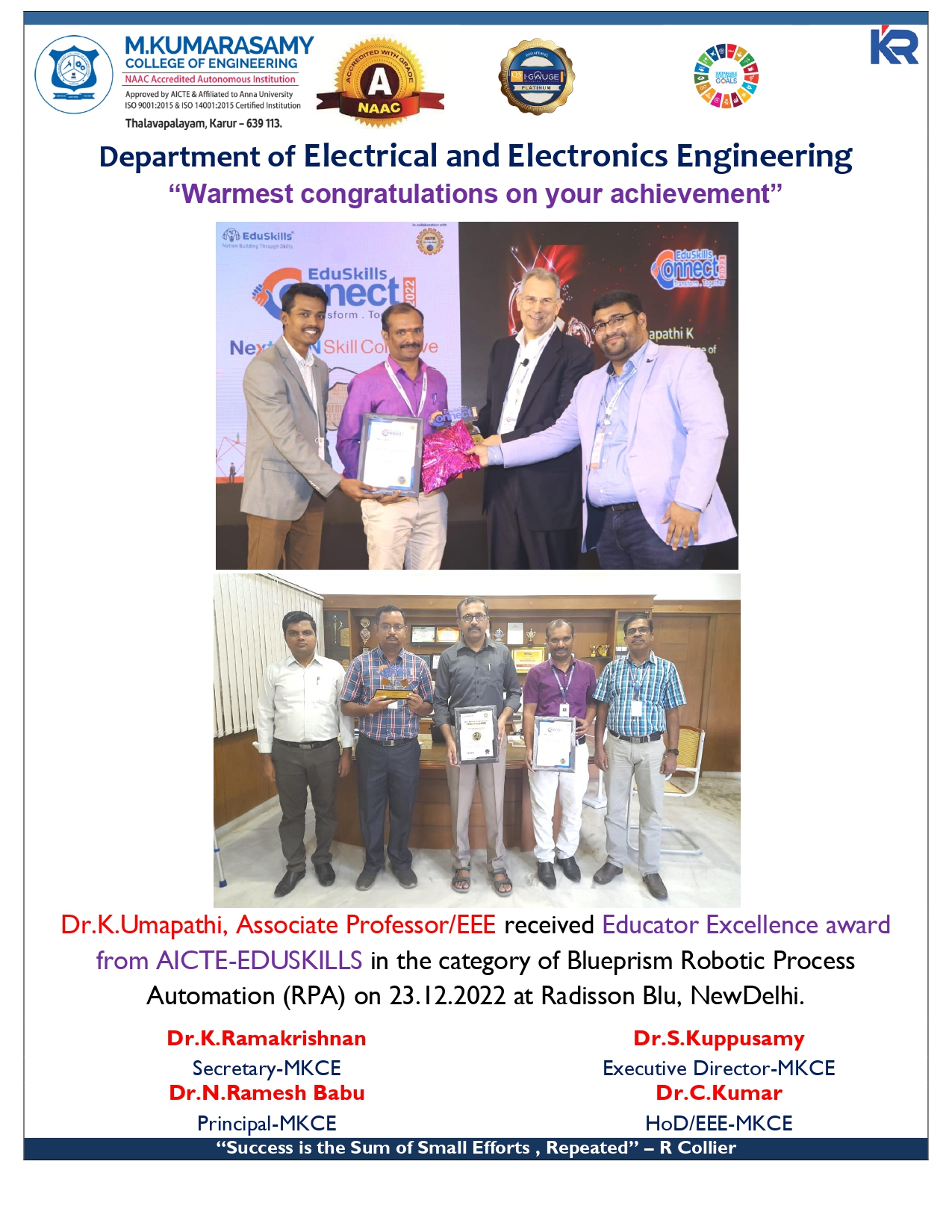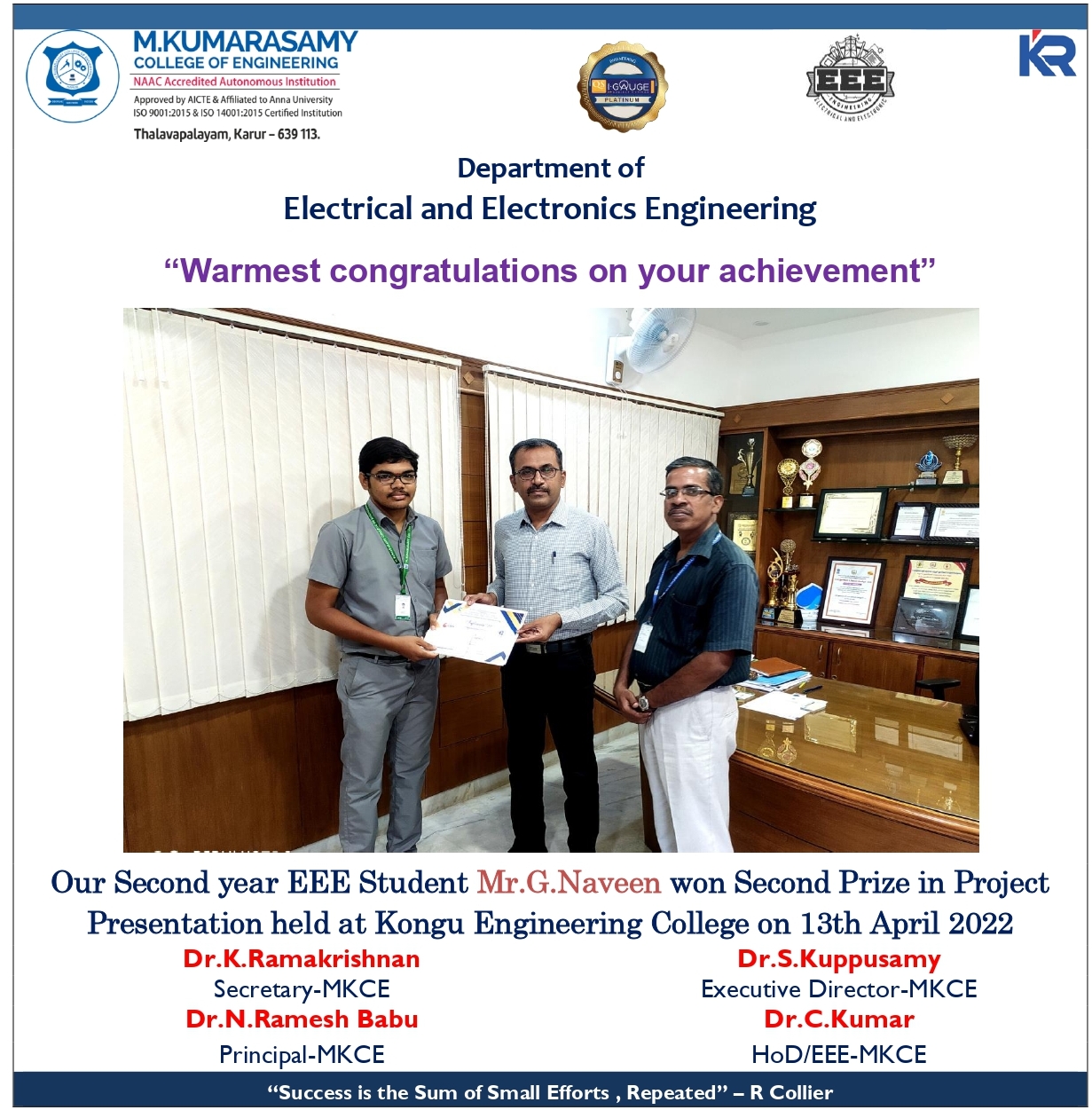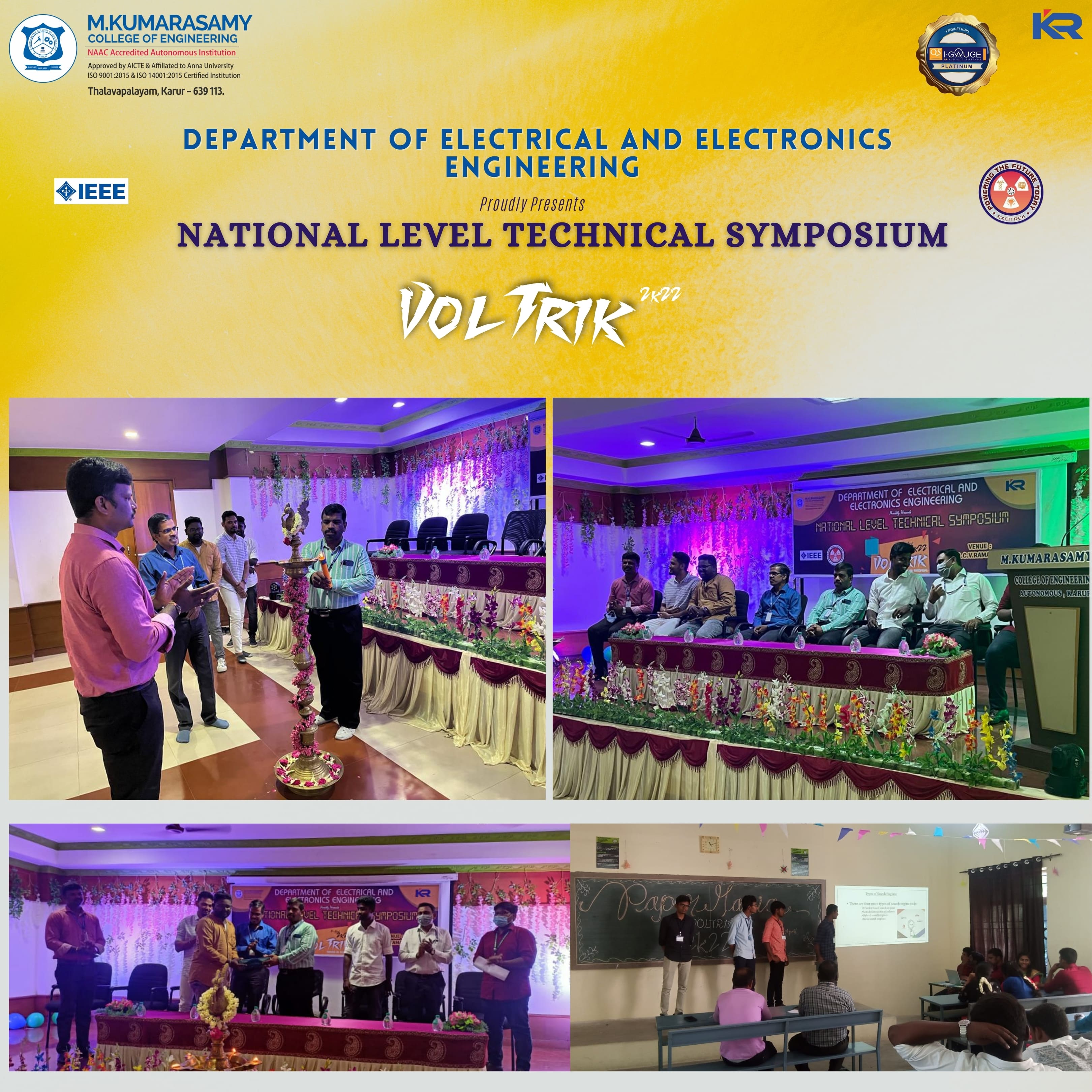

The Department of Electrical and Electronics Engineering has started the UG (B.E) in the academic year 2001 - 2002 with the intake of 60, and has been increased from 60 to 120 in the academic year 2009 - 2010. The PG (M.E) with the specialization of Power Systems Engineering has been started with 24 intakes in the academic year 2012- 2013. The Department is also a recognized research centre under Anna University in the academic year 2017-18.Our department has 8 laboratory venues with tremendous facilities which are useful to conduct laboratory courses for the both UG and PG Programmes. Our department has highly sophisticated computers Laboratory with 1 Gbps of Internet Facility. We are offering Ph.D programme and the department research centre is recognized by Anna University since 2017.
We have various softwares like MATLAB, Mi-Power, AU Power, ICT Circuit Tool, Labview Software. Our students avail these facilities full-fledged, which pave way to pack many laurels in the national and international contests. The lab facilities and the infrastructure are regularly upgraded and developed to meet the needs of the corporate world. We have received grant under AICTE MODROBS Rural Scheme to modernize Power Electronics Laboratory and it is equipped with Real-Time digital simulator, Solar PV Emulator, Server and True RMS Multimeter. Both the faculty members and students are actively taking part in the fundamental research, sponsored and consultancy projects. Our faculty members have published papers in innumerable National and International Journals, in addition 12 Books are published in various publications. Our department has signed MoU with numerous industries. Our department library has 2226 books and 100 E-journals. Our department has highly qualified and experienced faculty members with good Student Faculty Ratio. We are constantly producing illustrious Engineering graduates who occupy prestigious positions in the academia and industrial fields. We are to impart knowledge in the areas of Power Systems and Power Electronics and Drives, Electrical Machine Design and Control systems. Our department is the proud member of ISTE and IEEE student chapter.
Contact :
Dr.J.Uma
Head of the Department
Electrical and Electronics Engineering
M.Kumarasamy College of Engineering
Mobile: 8754015677
Mail: [email protected]
Duration:
4 years (Regular) / 3 years (Lateral Entry)
No. of Semesters:
8 (Regular) / 6 (Lateral Entry)
No. of Seats:
Total - 120 ( NRI Approval Status - Yes , PIO / FN / GULF quota / OCI Approval Status - No)
Eligibility:
10+2 system of Education. Must have secured a pass in Physics, Chemistry and Mathematics in the qualifying examination.
Scope for Higher Studies:
M.E. / M.Tech. / M.B.A./ M.S.
To produce smart and dynamic professionals with profound theoretical and practical knowledge comparable with the best in the field.
M1: Produce hi-tech professionals in the field of Electrical and Electronics Engineering by inculcating core knowledge.
M2: Produce highly competent professionals with thrust on research.
M3: Provide personalized training to the students for enriching their skills.
PEO1: Graduates will have flourishing career in the core areas of Electrical Engineering and allied disciplines.
PEO2: Graduates will pursue higher studies and succeed in academic/research careers.
PEO3: Graduates will be a successful entrepreneur in creating jobs related to Electrical and Electronics Engineering /allied disciplines.
PEO4: Graduates will practice ethics and have habit of continuous learning for their success in the chosen career.
PO1: Engineering knowledge: Apply the knowledge of mathematics, science, engineering fundamentals, and an engineering specialization to the solution of complex engineering problems.
PO2: Problem analysis: Identify, formulate, review research literature, and analyze complex engineering problems reaching substantiated conclusions using first principles of mathematics, natural sciences, and engineering sciences.
PO3: Design/development of solutions: Design solutions for complex engineering problems and design system components or processes that meet the specified needs with appropriate consideration for the public health and safety, and the cultural, societal, and environmental considerations.
PO4: Conduct investigations of complex problems: Use research-based knowledge and research methods including design of experiments, analysis and interpretation of data, and synthesis of the information to provide valid conclusions.
PO5: Modern tool usage: Create, select, and apply appropriate techniques, resources, and modern engineering and IT tools including prediction and modeling to complex engineering activities with an understanding of the limitations.
PO6: The engineer and society: Apply reasoning informed by the contextual knowledge to assess societal, health, safety, legal and cultural issues and the consequent responsibilities relevant to the professional engineering practice.
PO7: Environment and sustainability: Understand the impact of the professional engineering solutions in societal and environmental contexts, and demonstrate the knowledge of, and need for sustainable development.
PO8: Ethics: Apply ethical principles and commit to professional ethics and responsibilities and norms of the engineering practice.
PO 9: Individual and team work: Function effectively as an individual, and as a member or leader in diverse teams, and in multidisciplinary settings.
PO10: Communication: Communicate effectively on complex engineering activities with the engineering community and with society at large, such as, being able to comprehend and write effective reports and design documentation, make effective presentations, and give and receive clear instructions.
PO11: Project management and finance: Demonstrate knowledge and understanding of the engineering and management principles and apply these to one’s own work, as a member and leader in a team, to manage projects and in multidisciplinary environments.
PO12: Life-long learning: Recognize the need for, and have the preparation and ability to engage in independent and life-long learning in the broadest context of technological change.
PSO1: Apply the basic concepts of mathematics and science to analyse and design circuits, controls, Electrical machines and drives to solve complex problems.
PSO2: Apply relevant models, resources and emerging tools and techniques to provide solutions to power and energy related issues & challenges.
PSO3: Design, Develop and implement methods and concepts to facilitate solutions for electrical and electronics engineering related real world problems.

Professor and Head

M.E., Ph.D.,
Professor

M.E., Ph.D.,
Professor

M.E., Ph.D.,
Professor

M.E., Ph.D.,
Associate Professor

M.Tech., Ph.D,
Associate Professor

M.E.,Ph.D.,
Assistant Professor

M.E.,Ph.D.,
Assistant Professor

M.E.,Ph.D.
Assistant Professor

M.E.,Ph.D.
Assistant Professor

M.E.,(Ph.D)
Assistant Professor

M.E.,(Ph.D)
Assistant Professor

M.E.,(Ph.D)
Assistant Professor

M.E.,(Ph.D)
Assistant Professor

M.E.,(Ph.D)
Assistant Professor

M.E.,(Ph.D)
Assistant Professor

M.Tech.,(Ph.D)
Assistant Professor

M.E.,(Ph.D)
Assistant Professor

M.E.,(Ph.D)
Assistant Professor

M.E.,(Ph.D)
Assistant Professor

M.E.,(Ph.D)
Assistant Professor

M.E.,(Ph.D)
Assistant Professor

M.E.,(Ph.D)
Assistant Professor

M.E.,(Ph.D)
Assistant Professor

M.E.,(Ph.D)
Assistant Professor

M.E.,(Ph.D)
Assistant Professor

M.E.,
Assistant Professor

M.E.,
Assistant Professor

BOS Chairperson
Professor & Head , Department of EEE,M.Kumarasamy College of Engineering,Karur

University Nominee
Associate Professor , Department of EEE, Government College of Engineering,Srirangam

Subject Expert
Professor ,Department of EEE,Puducherry Technological University,Puducherry

Subject Expert
Associate Professor . Department of EEE,National Institute of Technology,Trichy

Industry Expert
Director Technical Operation, Emcog Solutions,Chennai

Alumni Member
Assistant Engineer Operation & Maintanence , TANGEDCO,Erode Electricity Distribution Circle,Kodumudi

Student Member
II Year,Department of EEE,M.Kumarasamy College of Engineering,Karur

Student Member
III Year,Department of EEE,M.Kumarasamy College of Engineering,Karur

Student Member
IV Year,Department of EEE,M.Kumarasamy College of Engineering,Karur

Professor / Associate Professor / Assistant Professor
Department of EEE,M.Kumarasamy College of Engineering,Karur

EEE Lab 1 - Power System Simulation Laboratory

EEE Lab 2 - Electronic Devices & Circuits Laboratory

EEE Lab 3 - Power Electronics Laboratory

EEE Lab 4 - Project Laboratory

EEE Lab 5 - Electric Drives and Control Laboratory

EEE Lab 6 - Electrical Machines II Laboratory

EEE Lab 7 - Electrical Machines I Laboratory

EEE Lab 8 - Control Systems Laboratory

EEE Lab 9 - Basic Electrical and Electronics Engineering Laboratory




2024 © M.Kumarasamy College of Engineering All Rights Reserved | Designed and Maintained by Technology Innovation Hub - MKCE